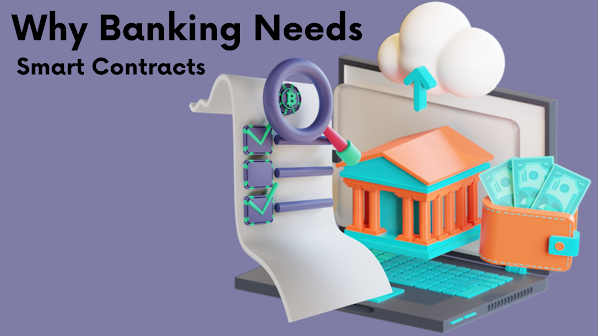5 Reasons Why Banking Needs Smart Contracts So Desperately
Blockchain has a significant influence on several businesses. Many digital currencies are available on the market, each offering a novel way for consumers to engage with money.
In contrast, there are several other technological possibilities at the heart of blockchain. In that case, smart contracts are one to which the financial sector is paying more attention.
Do you wish to use smart contracts to scale your banking business? Be smart and seek an expert to get the best smart contract development services.
Salient Smart Contracts In Banks
Trust and agreements are the foundation of Financial sectors. In the event of a breach, these contracts' provisions are enforceable by third parties. Have you ever wondered what it would be like if infused with smart contracts?
Let's examine how smart contracts play a primary role in the banking industry.
Manage Insurance Claims
Insurance claim resolution can be laborious as insurers work to eliminate bogus claims. Here, with smart contracts, customers can submit claims directly and are automatically verified by the blockchain network's code. Since the claim records are objectively examined based on the decentralization of the ledgers, banks and insurers remove the possibility of paying out fake claims.
Instantaneous Remittance
Several banks have sought smart contract creation services to increase their remittance time while retaining accuracy and transparency. The distributed nature of smart contracts makes them incommutable. Additionally, smart contracts hasten post-trade settlements since the bank and consumer can automatically verify transaction facts.
Open-Book Auditing
Traditional contracts follow stringent rules. Since banks offer a range of services, they retain a record of every transaction. These records are frequently manipulable and might produce inaccurate information. But when infused with smart contracts, banks can increase shareholder engagement through proxy voting. It schedules general meetings in banks. In addition, all parties it enables transparent decision-making among all parties.
Know Your Customer
A bank must confirm the customer's identification before funding business transactions or extending a loan to a consumer. But when added with smart contracts, banks can easily share credit scores with individuals. In addition, it also makes it easier for users to comply with relevant legal obligations, such as filing tax returns, by guaranteeing that their transaction statements are processed instantly.
Value-Added
By incorporating smart contracts into their systems, banks stand to earn considerably. Smart contracts are a way to cut operating expenses, mainly administrative expenditures. Additionally, Banks limit the likelihood of inaccurate records and increase transparency, which avoids false claims. As a result, banks will have improved client connections and exceptional consumer satisfaction.
Final Feather
Incorporating smart contracts into the banking industry is worthwhile. It helps keep their customers engaged with the banks in all possible ways. Are you under the banking domain and want to infuse a smart contract? Be smart and consult the leading smart contracts development and build more trust among the customers.




Comments
Post a Comment